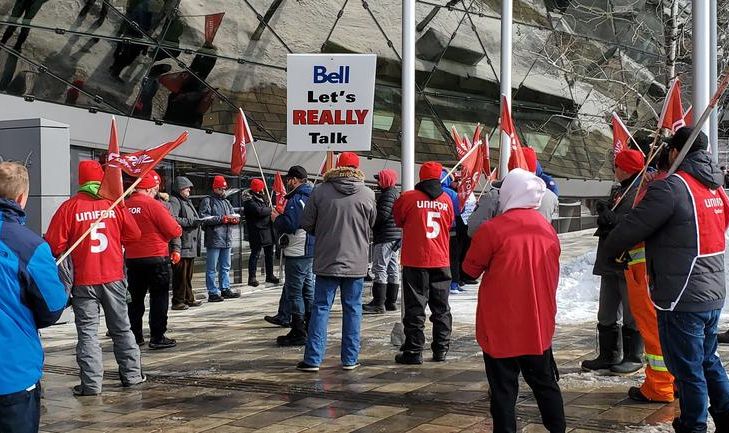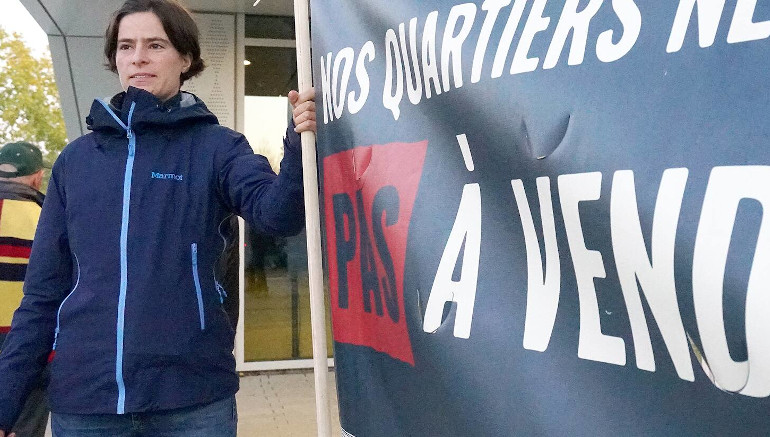For decades now the Canadian telecommunications industry has been an oligopoly of “the big three,” Rogers, Telus, and Bell. These three companies each have over ten million subscribers and own essentially all of the infrastructure in the country. The next largest competitor, Shaw, has less than two million subscribers. But recently, Rogers announced that it intends to buy Shaw in a $26 billion merger deal. This would undoubtedly be a setback for those who think that competition will drive down Canadian’s notoriously high cell phone bills.
In the last federal election, the Liberal Party promised to reduce cell phone bills by 25 percent. Even if they achieved that goal, Canadians would have some of the most expensive phone bills in the world as Canadian wireless fees are already 157 percent higher than the G-7 average. Before the merger can go ahead it needs to be approved by the federal Competition Bureau, the CRTC, and the federal government. So far, the Liberal government has not said whether they will allow it to go ahead or attempt to make any changes to telecom regulations in response.
Competition and monopoly
The Canadian telecommunications industry has always been highly centralized, with Bell dominating the market in Ontario and Quebec for most of the 20th century. Often smaller companies would open up in regions without Bell service, only later to be acquired by Bell or one of the other companies that would go on to become the big three. In recent decades, the lowest prices in the country have been found in Saskatchewan, Manitoba and Quebec, and each of these provinces have had independent regional providers that compete with the big three.
So, there was hope that Shaw, which started out as a regional competitor based in the west, would introduce more competition and drive down prices across the country. However, the fact of the proposed merger with Rogers, even if the federal government decides to block it, shows the fundamental limitation of competition based on private ownership: it will always lead to centralization in the long run.
This trend to centralization and monopoly has plagued capitalism throughout its history and was written about by Marx and Engels in the 19th century. The basic idea of competition limiting prices is that if two companies are competing, one company can’t set their prices too high, or the other company will undercut them and take all their customers. Indeed, this much is true. But there are innumerable ways that larger companies can take advantage of their size, wealth, and access to capital for investment, to outcompete and gobble up any smaller competitors. Even if an industry arrives at a stage where there are many small, equally sized competitors, this is a highly unstable situation; some companies fail, others absorb their market share, and in the long run only a few large players will remain.
Ironically, proponents of markets must rely on the government to intervene to prevent oligopolies from forming and preserving “free” competition. This is of course a Sisyphean task. One of the most famous and explosive incidents of the state stepping in to break up a monopoly was Standard Oil. In 1904 Standard Oil controlled 91 percent of oil production in the United States. Under public pressure the government passed antitrust legislation, and eventually in 1911 Standard Oil was split into 34 smaller companies. Of course, in the intervening 110 years most of those companies have since re-merged, absorbed or were absorbed by other companies, and almost all are now owned by Chevron, ExxonMobil, and BP.
Public telecom in the prairies
In addition to today’s proposed merger between Rogers and Shaw, we can look at the case of Manitoba and Saskatchewan to prove the rule that competition based on private ownership eventually leads to centralization. For most of the 20th century the regional providers in the prairies provinces, Manitoba Telecom Services (MTS) and SaskTel, have been crown corporations owned by the public. The conservative Saskatchewan Party under Brad Wall considered privatizing SaskTel in 2017 but retreated due to public opposition. While SaskTel remains a crown corporation, the MTS was privatized in 1996 by the Conservative government.
The MTS shares were sold by the provincial government below their market value to a minority of privileged investors. Most of these investors proceeded to immediately resell their shares for their real value to make a tidy profit. So right out of the gate, the people of Manitoba were cheated out of the full value of the sale in order to make a profit for a few rich investors. The privatized MTS then proceeded to attack workers by cutting jobs and converting full-time positions to part-time. The quality of services provided to the public fell while prices remained the same or rose. Plus, the profits of the telecom company, formerly kept in Manitoba to fund provincial programs and services, now are moved out of the province at the whims of the private owners.
Even so, the privatized MTS remained a source of competition in the Manitoba telecom market and prices there remained below the national average. But in 2017 MTS was purchased and absorbed by Bell, just as Shaw finds itself being absorbed by Rogers today. It’s only a matter of time before the big three are able to drive prices in Manitoba up to match the rest of the country. On the other hand, SaskTel is protected from these kinds of mergers because it’s owned by the people of Saskatchewan, not a minority of private investors.
The limits of private ownership
When monopolies get too powerful it is bad for everyone else: that much is agreed by socialists and proponents of capitalism. When they get too powerful there is often a public outcry to break them up. Just like the historical example of Standard Oil, today there is talk in Washington about breaking up big tech companies like Amazon, Facebook, and Google. Today these companies wield enormous power and influence, even rivalling the power of states themselves. But socialists know that breaking up private oligopolies is just another round of rolling the boulder to the top of the hill only to see it start to roll back down. Instead, imagine what good could be done for humanity with the powerful infrastructure and technology of Amazon, Facebook, and Google if these companies were taken into public ownership!
The existence of oligopolies lays bare the fact that the private owners and executives of these companies have outlived their usefulness. The productivity of infrastructure and equipment has been developed as much as private ownership is capable of, without subsides and public funds. Further development is desirable and necessary, but it won’t get done if it isn’t profitable. Consider, for example, that high-speed broadband services are unavailable to half of rural homes in Canada, and two-thirds of Indigenous communities.
It’s not just a problem with rural areas though. As COVID-19 has shown, even if high speed internet is technically available in the big cities, it’s still practically inaccessible for many. In Toronto, 38 percent of households, almost 2 in 5, still don’t have high speed internet access; this is mostly because profits are not high enough. This, despite the fact that in 2016 the CRTC declared that high speed internet access is a basic service that everyone in our society needs access to. The truth of this has never been more obvious than during the COVID-19 pandemic, since high speed internet access is needed to apply for government services, receive public health announcements, to participate in school, university, or to work from home.
Pro-market federal governments have been attempting to “encourage” private telecoms to expand these services for years. At the end of 2020, the Liberal government said that it was on track to get high speed internet access to 98 percent of Canadians by 2026. But practically speaking, this just means the government is giving more money to already fabulously profitable telecom companies. In March of this year, the federal government announced a deal with the CAQ government in Quebec to give $826.3 million to the telecom companies in exchange for expanding services. Bell Media, in particular, will receive $161.5 million. But Bell also made $2.5 billion on profits in 2020! Not only that, Bell has already received $122 million of public money through the Canada Emergency Wage Subsidy (CEWS). This program was supposedly meant to help companies keep their workers on the payroll during the pandemic, but Bell proceeded to take the money and then fire over 200 workers!
The big three telecom companies made a collective $5.4 billion in profits last year, so it’s not like they can’t afford to improve services and lower prices. The fact of the matter is that they simply won’t expand services unless it’s profitable. So, if the government wants to provide those services, they have to pay for it, one way or the other. But in that case why maintain private ownership at all? The private telecom oligopoly is a parasitic institution that takes public funds while making huge profits for a privileged minority, all while refusing to build needed services. The only rational solution is expropriation and public ownership. Publicly owned telecom is the only way that we can achieve an equitable distribution of quality services at affordable prices; it would remove the inefficiencies of private competition and the need to enrich the minority of owners and investors on the consumer’s dime.
While Socialist Alternative knows that public ownership of telecom is necessary to continue to develop telecom services at affordable prices, we also recognise that it is not sufficient. Top-down bureaucratic management of public companies often leads to wasteful mismanagement and does not necessarily improve the conditions for workers. This is why, in addition to calling for public ownership of telecom, we also call for democratic control by the workers, who know best how to operate and maintain them.
Attempts at regulation
The Liberal government primarily serves the interests of big business and is no friend to working Canadians. Of course, they will not attempt to take the Canadian telecom industry into public ownership and will likely approve the Rogers-Shaw merger. They will more likely attempt to tweak some of the regulations in the industry in an effort to keep their election promise about reducing costs to consumers.
One option that the CRTC has proposed is the introduction of mobile virtual network operators (MVNO) with mandatory access to the big three’s infrastructure. An MVNO is a telecom service provider that does not own its own infrastructure but instead leases it from the companies that do. The CRTC has considered making it mandatory for traditional Canadian telecom companies to offer the use of their infrastructure to MNVOs. A similar situation already exists for internet services.
On the one hand these kinds of arrangements reveal the basic contradictions of privately owned telecom infrastructure in the first place. If private ownership is a barrier to infrastructure access, then why not take it into public ownership rather than creating a government-imposed scheme that compels private telecoms to sell access? On the other hand, the private telecoms are resisting this meagre proposal from the CRTC because it would introduce more competition!
Telus recently threatened to cut thousands of jobs and a billion dollars of infrastructure spending if the CRTC went ahead with mandatory MVNOs. This is the threat of a capital strike and is a slap in the face of the Telus workers who create all of the profits for their bosses and investors! It shows the basic conflict between private ownership and the public interest. There is no reason for us to allow these jobs to be held hostage by the bosses. The workers are the ones who make the company run and are responsible for all the profits! Any private company that threatens to cut jobs when the government proposes regulations has forfeited its right to operate and should be taken into public ownership.
For publicly owned, democratically run telecom
The private telecom industry today does not exist to provide quality services at reasonable prices – rather it exists to make investors and CEOs rich at the expense of working Canadians. But those same CEOs and investors are all friends of Liberal and Conservative politicians. That’s why we expect the merger deal to go ahead along with some small tweaks to the regulations to make it at least look like the government is trying to reduce prices. Socialist Alternative calls for taking the big three into public ownership and put under democratic control and management by the workers. This would transform the purpose of the telecom system into providing quality services rather than lining the pockets of investors. It would allow us to finally achieve universal coverage of high-quality network services to all Canadians including Indigenous communities, at affordable prices for all.




